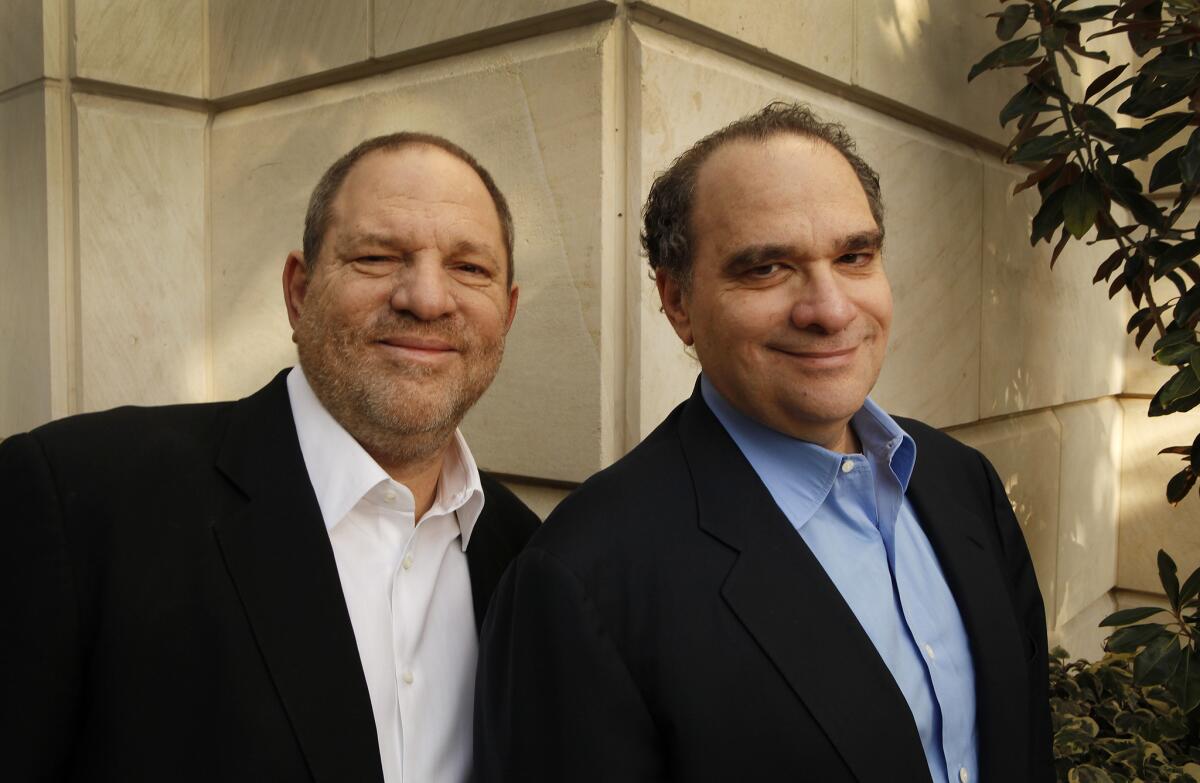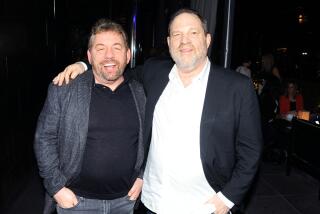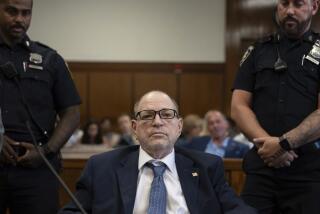Harvey Weinstein was convicted and his brother wants a comeback. Some aren’t having it

- Share via
Harvey Weinstein, the once powerful movie mogul, was the picture of disgrace. On Wednesday, after the convicted rapist was sentenced to 23 years in prison, he was handcuffed in his wheelchair and rolled off to jail for processing.
He now awaits extradition to California, where he is charged with multiple counts of sexual assault stemming from two alleged attacks in Los Angeles and Beverly Hills in 2013.
While activists and many of Weinstein’s accusers expressed “vindication” and satisfaction with the verdict, one issue remains unsettled among them: the publicists, agents and handlers who in their view either aided Weinstein’s litany of abuse or turned a blind eye to it.
Chief among them, his accusers and former associates say, is Bob Weinstein, Harvey’s younger brother, longtime business partner and co-founder of Miramax Films and later Weinstein Co.
Since the bombshell allegations of sexual abuse against Harvey, 67, first came to light in 2017 in the New York Times and the New Yorker, Bob, 65, has largely avoided the spotlight, distancing himself from his brother, insisting that although he believed his sibling was unfaithful to his wife, he had no idea about the extent of Harvey’s predatory behavior.
Last Monday, the Manhattan Supreme Court unsealed a trove of documents revealing emails in which Bob, according to reports, excoriated his brother. In one he wrote: “U deserve a lifetime achievement award for the sheer savagery and immorality and inhumanness, for the acts u have perpetrated.” In another he fumed, “I pray there is a real hell. That’s where u belong.”
Harvey Weinstein has denied having nonconsensual sex with the women who have accused him of misconduct.
Still, the question nags, what did Bob know?
In recent months, the younger brother has quietly been staging a comeback. In October, he announced the launch of a New York-based production company, Watch This Entertainment, focusing on comedies, family fare and high-end adult thrillers.
He tapped Pantea Ghaderi, a former publicity executive at Weinstein Co., as president of creative development. Their first project is the animated feature “Endangered,” with the actress Téa Leoni producing and lending her voice. The French animation collective Illogic, nominated for an Oscar in 2018 for the animated short “Garden Party,” will direct.
Yet despite Bob’s protestations and decoupling from his brother, those with claims against the company and former associates balk at his current rehabilitation attempt. Some believe that Bob may have gotten a pass, maintaining that questions remain about what he knew and if and how he facilitated his brother’s abuse.
After all, he paid out a settlement agreement involving two of his brother’s victims, according to the women.
Many of Harvey’s accusers say a code of conduct clause in his last contract approved by Bob and other board members suggests he had knowledge of his brother’s behavior. Drawn up in 2015, it has a clause allowing for an escalating scale of fines from $250,000 to $1 million that Harvey was required to make if his “misconduct results in the Company making Obligated Payment to a person damaged by such misconduct,” according to a provision in his contract reviewed by The Times.
“I think that Bob is on the top of a pyramid of the many men and women who were Harvey Weinstein enablers,” said Rowena Chiu, a former assistant for Harvey who had worked in Miramax’s London office. She alleges that Harvey attempted to rape her during the 1998 Venice International Film Festival.
Chiu and another London assistant, Zelda Perkins, who accused Harvey of rampant bullying and sexual harassment, split a $316,000 settlement. That payment, as was first reported in the New Yorker, came out of Bob Weinstein’s personal bank account.
“Bob was the closest to Harvey, more than his lawyer,” Chiu said. “He didn’t sneeze without Bob knowing about it.” She contends that although Bob may say he wrote these checks to cover up his brother’s adultery, she believes otherwise.
“Whatever narrative he wants to tell himself, he was not covering up an affair; [Harvey] was sexually assaulting women and [Bob] was paying women to silence them.”
Bob Weinstein and Ghaderi did not respond to requests for comment.
I pray there is a real hell. That’s where u belong
— Bob Weinstein in an email to his brother Harvey Weinstein
Bob and Harvey Weinstein have always had a complicated, codependent and volatile relationship.
The sons of a Manhattan diamond cutter and a housewife, they grew up sharing a bedroom in Queens. After Bob dropped out of college, he joined his brother in Buffalo, N.Y., where Harvey made a name for himself as a local concert promoter. The younger brother took up promoting film festivals.
In 1979, they founded Miramax Films. Launched as a film distributor and named after their parents Miriam and Max, the brothers’ venture changed the game for commercially successful indie movies. During the 1990s they dominated the market, churning out award-winning, critically acclaimed hits like “The English Patient” and “Shakespeare in Love.”
Harvey Weinstein held sway over the art house films while his brother ran the numbers and Dimension Films, which produced commercially successful action, horror and comedy films like the “Scream” and “Scary Movie” franchises.
Harvey had a sixth sense for cultural storytelling; Bob had a head for numbers. Harvey was the more flamboyant of the pair, schmoozing with political figures and power players from Hollywood to D.C. Bob was frequently referred to as the “quiet brother.”
After they sold Miramax to Walt Disney Co. in 1993 for $60 million and subsequently established Weinstein Co., Bob remained in the background.
“Bob had his own skill-set,” Bill Mechanic, a movie producer and former studio executive who worked with the brothers after they joined Disney, told The Times in a 2017 interview. “He was making movies he liked. They were rougher, they were horror action pictures. He had a more commercial sensibility.”
Relations between the two ricocheted from contentious to volatile.
A former senior Miramax executive who reported to both Harvey and Bob described the atmosphere in the office as abusive and belittling and working for them as like being with “two rival siblings who wanted to date the same person.”
While “Bob could be rough around the edges and had his issues,” one of the major differences between the two brothers was that Bob could admit when he was wrong, noted the former executive.
“Harvey could never admit that or that someone did a better job,” noted the executive, who asked not to be identified because he still works in the industry. “I found Bob the far better, more fair guy to work with, although he was not the perfect boss.”
Over time, the brothers’ relationship deteriorated.
In 2011, Harvey punched his brother in the face, knocking him to the ground in the presence of several Weinstein Co. executives following an argument about studio resources. Bob cited the incident in a letter he sent to his brother in 2015 that appeared in the book “She Said,” written by the New York Times reporters Jodi Kantor and Megan Twohey, in which he also urged Harvey to seek help for what he called “misbehaviors.”
Yet while Harvey has been variously described as a beast, Bob was no beauty. One person who worked for them described Harvey as a potent mix of charm and anger; Bob, they explained, was absent the charm.
In the wake of the blockbuster allegations against Harvey, numerous accounts surfaced about Bob’s own behavior.
During the Wall Street Journal’s WSJ D.Live technology conference in 2017, Jeffrey Katzenberg, who ran Disney’s movie studio after it acquired Miramax, said, “Bob Weinstein was genuinely abusive to people in my company.” He added, “The one person who revealed himself in a way that was unacceptable to me was, in fact, Bob.”
In 2012, the New York Daily News reported that Bob’s wife, Anne, filed for divorce and sought an order of protection because she feared “bodily harm.” He denied any abuse.
Following the revelations of Harvey’s rampant sexual misconduct in the fall of 2017, the Weinstein Co. board, including Bob, fired him. Bob attempted to hold on to the film studio, but the scandal soon torpedoed that bid.
A $500-million deal to sell the company and avoid bankruptcy fell apart after the New York attorney general accused Weinstein Co. of complicity in Weinstein’s behavior, singling out its chief operating officer, David Glasser, for his failure to respond to complaints about Harvey’s treatment of women. In February 2018, the board fired Glasser.
A month later, Weinstein Co. filed for bankruptcy protection. By the summer, the Dallas-based private equity firm Lantern Capital Partners bought the studio for $289 million, including its 277-film library. Last March, former Metro-Goldwyn-Mayer Studios Chief Executive Gary Barber joined Lantern Entertainment to create a new company, Spyglass Media Group, out of what was left of Weinstein Co.
As the film studio was sold off for pieces and the number of Weinstein accusers swelled, several civil lawsuits were filed against Harvey, including a federal class-action suit. Last year, after months of wrangling, infighting and uncertainty, a controversial $47-million settlement was reached between Weinstein, his former film studio’s board and several women who accused the disgraced movie mogul of sexual misconduct, according to attorneys involved in the negotiations.
Under terms of the deal, about $25 million would be allocated to the accusers, another $7.3 million to unsecured creditors and former Weinstein Co. employees, and about $12.2 million was earmarked to pay legal fees of the studio’s directors and officers, according to a copy of the settlement term sheet obtained by The Times. (Under the proposed settlement, Bob Weinstein would pay the company’s debtors 20% of the net proceeds recovered from Lantern Entertainment).
A judge has yet to approve the proposed settlement, however.
And the tentative agreement has drawn fire for offering inadequate compensation to the victims while enabling Weinstein and the directors of the now-defunct movie studio, including Bob, to evade accountability or liability. Attorneys for two of the accusers have publicly rejected the proposal.
Last week, seven victims penned an open letter to New York Atty. Gen. Letitia James objecting to the civil settlement, calling it “insulting to all of the survivors in that it represents a small fraction of what should be paid by Mr. Weinstein, his former directors and officers, and large multi-billion dollar insurance companies.”
They complained that too much of the settlement originally intended for victims “will instead be paid to lawyers for Harvey Weinstein (a now-convicted felon), his brother Robert Weinstein and other ultra-wealthy former members of the board of directors of the Weinstein Company, who turned a blind eye, allowing Harvey Weinstein to victimize us and so many others.”
Thomas Peter Giuffra, an attorney representing Alexandra Canosa, a producer on the Netflix series “Marco Polo” who alleges that Harvey Weinstein raped and abused her over several years, contends this settlement is “unfair” and thinks that Bob Weinstein’s role in his brother’s behavior requires more scrutiny.
“They worked closely,” he said. “He was aware of what his brother was up to. It seemed all Hollywood was aware; they were making jokes at the Academy Awards for God’s sake.”
Giuffra’s client has a pending civil suit against Harvey. In a recent letter filed in Manhattan federal court, the attorney said he would depose Bob among others.
“We want to see what he knew at the time and if he had any involvements in any prior complaints,” Giuffra said. “We want to know about the whole history of this whole mess and what his knowledge is.”
So far, true to his moniker, Bob Weinstein has remained quiet. His new film company, which has an office in New York and was formed as a limited liability corporation in Nevada, has no publicly listed financial backers; it aims to develop two to three films per year.
“I hope he has as much success as Rowena and I and the many other Weinstein victims have had in gainful employment in the movie industry,” said Perkins, Harvey’s former Miramax assistant in London who broke her nondisclosure agreement to speak out about his treatment.
A signatory to the open letter to the New York attorney general, she added, “Our careers were totally ruined. Let’s see if Bob receives the same treatment that those of us who left Miramax and the Weinstein Co. had.”
More to Read
Inside the business of entertainment
The Wide Shot brings you news, analysis and insights on everything from streaming wars to production — and what it all means for the future.
You may occasionally receive promotional content from the Los Angeles Times.










